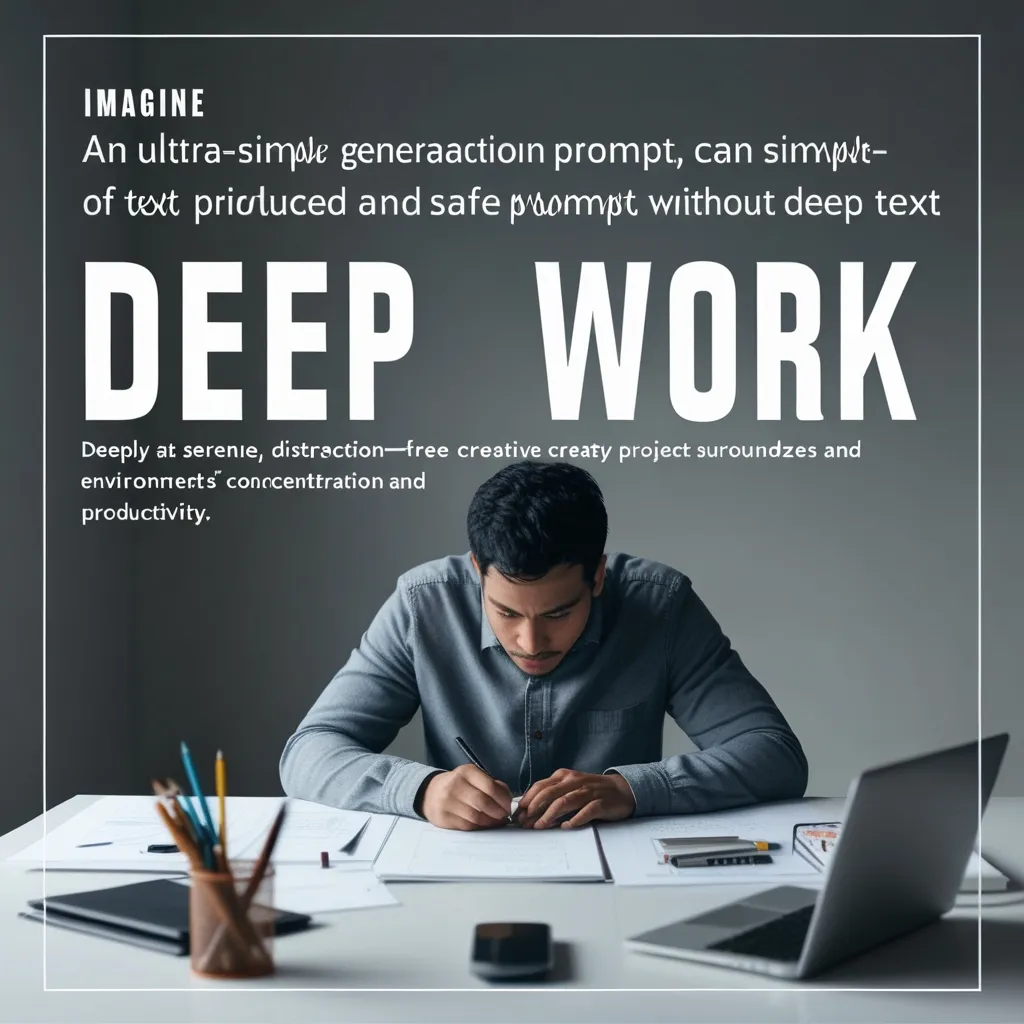In this super-connected, always-buzzing world we live in, maintaining focus is like finding a needle in a haystack. Enter the magic of deep work – this gem of a concept can skyrocket productivity and bring professional achievements within your grasp.
Deep work is the art of zoning in on one task without letting distractions pull you away. This kind of focus is not just about keeping your phone out of reach; it’s about creating a mental bubble where you dive so deep into work that you forget the world exists. This kind of concentration is where creativity flourishes, complex problems are solved, and skills are honed. Think of legends like Charles Darwin and Carl Jung; they harnessed deep work to make their mark.
Now, more than ever, with automation and AI taking over many jobs, the ability to perform deep work stands out. It’s your secret weapon to producing top-tier results in a noisy digital age. By blocking out the constant stream of notifications, you reclaim your cognitive edge, zooming past tasks with a high level of proficiency and creativity. In a global market, that’s your ticket to standing out.
But it’s not just about willing yourself to focus – it’s about crafting an environment that supports you. Picture this: you’ve got a few strategies to help build this bubble of focus around you.
- A monastic approach might mean shutting off from most engagements. This is ideal for writers, researchers, or anyone needing solitude to thrive. Not necessarily feasible in a bustling workplace, but hey, worth a shot when deep focus is needed.
- Then there’s the bimodal approach, where your calendar is clearly split. One part devoted to deep work, the other to everything else.
- Rhythmic approach is about slotting deep work regularly through your day. Aim for at least 90-minute windows – this gives you time to dive deep before coming up for air.
- For pros in deep work, a journalistic approach works. Snatch any spare moment for focused work.
Creating a deep work routine is like setting the stage for a play. The environment matters. A distraction-free zone is your best bet. Can’t find one? Noise-canceling headphones are your friend here. Start with small time blocks dedicated to deep work, maybe 15 minutes, and gradually stretch them out as your concentration muscles strengthen.
Define your rules. Decide if your phone stays off, whether the internet is allowed, and how you’ll measure success. All these little details make a big difference in ensuring your deep work sessions are productive.
Rituals are your golden ticket to deep work. Having a set space gets you in the right frame of mind quicker. When you show up to your chosen spot, your brain knows it’s go-time. Clear metrics to gauge your effort, like words penned per minute or total internet ban, help too. And before diving deep, make sure you have what you need, be it a hot cup of java or the right software.
Setting specific goals enhances your chances of sticking to deep work. Instead of general plans, try something like, “On Monday at 10 AM, I’ll spend an hour drafting that project report.” It might sound rigid, but it works.
Distractions will try to crash your deep work party, but you can manage them. Block websites that pull you off course, maybe with some browser extensions. Stick to your commitment with some accountability – measuring your hours of deep work and reviewing your achievements weekly keeps you on track.
Breaks are essential. Deep work isn’t about clocking long hours; it’s about quality work. After a deep dive, take a step back. Chill. This downtime is where the magic of new ideas happens, boosting both your creativity and wellness.
Sometimes, making a grand gesture can ramp up your deep work game. Think of Bill Gates’ ‘think weeks,’ where he holes up in a cabin to read and think deeply. Maybe ask for a few days to work from home on a significant project. These dramatic changes can signal your brain to take the task seriously, enhancing your focus.
Collaboration also has its place. While deep work often means solo effort, bouncing ideas off others can spark creativity that reignites when you’re back alone. Just make sure collaboration time doesn’t eat into your deep work sessions.
Downtime is just as crucial as the work itself. Without proper rest, deep work leads to burnout. Recharge, relax, and then dive back in with renewed vigor.
Deep work can propel your career to new heights. Delivering top-notch output consistently sets you apart. It shows your dedication and value, making you stand out in any professional setting.
In a world buzzing with distractions, mastering deep work is your ace. Craft the right environment, build a solid routine, manage distractions, and ensure you take breaks. This approach doesn’t just boost productivity; it turns you into a high-performing, valuable professional ready to tackle the world head-on.






